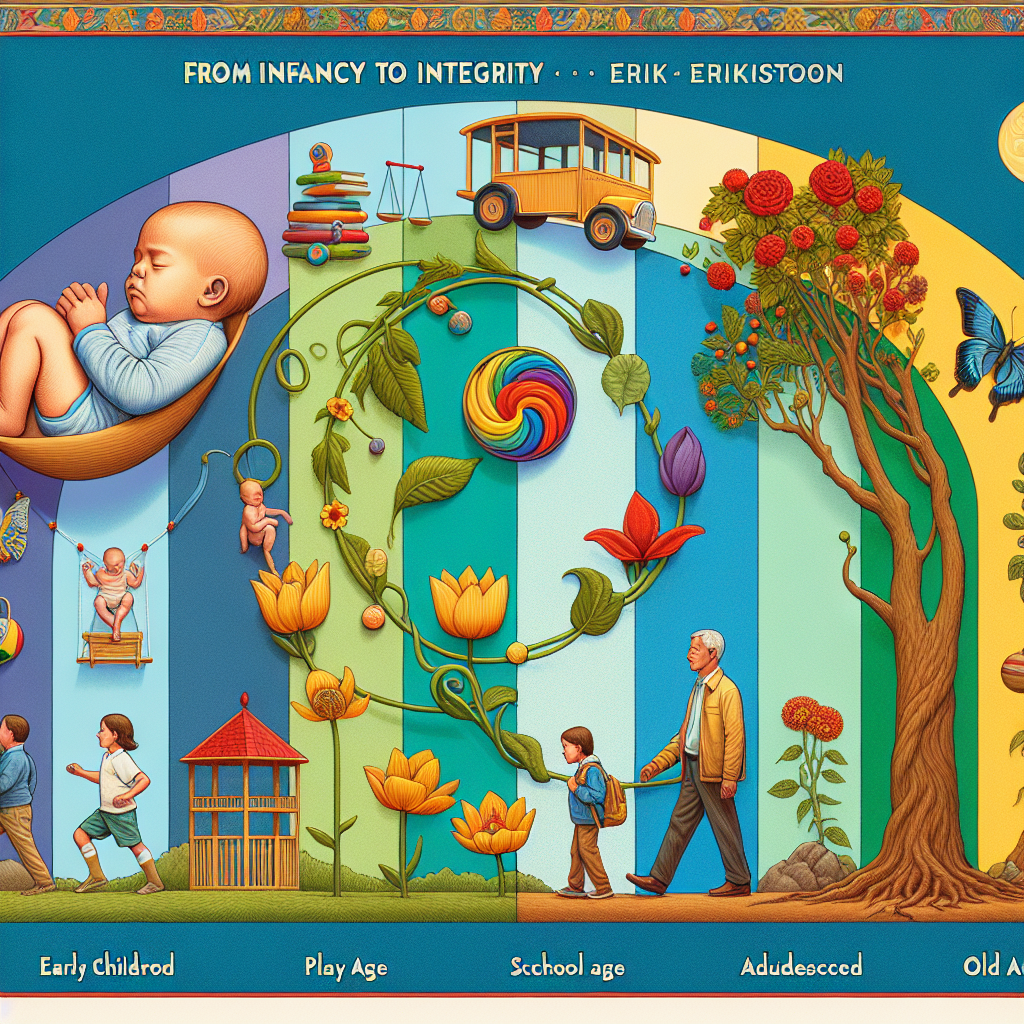
Introduction
Understanding human development is key to grasping how we grow, learn, and become who we are. Erik Erikson’s Eight Stages of Psychosocial Development provide a powerful framework for this exploration. From Infancy to Integrity: A Deep Dive into Erik Erikson’s Eight Stages not only helps us understand the challenges we face at different life stages but also highlights how resolution—or lack thereof—impacts our future. In this article, we will unpack Erikson’s stages, explore relevant case studies, and provide actionable insights that can serve you or those around you.
The Framework of Erikson’s Stages
Erik Erikson, a developmental psychologist, introduced his theory in 1950, suggesting that personality development occurs in eight distinct stages from infancy to late adulthood. Each stage presents a psychosocial challenge that individuals must navigate effectively.
The Eight Stages: An Overview
| Stage | Age Range | Psychosocial Crisis | Successful Outcome |
|---|---|---|---|
| 1. Trust vs. Mistrust | Infancy (0-1 year) | Trust vs. Mistrust | Trust |
| 2. Autonomy vs. Shame | Early Childhood (1-3 years) | Autonomy vs. Shame | Independence |
| 3. Initiative vs. Guilt | Preschool (3-6 years) | Initiative vs. Guilt | Initiative |
| 4. Industry vs. Inferiority | School Age (6-12 years) | Industry vs. Inferiority | Competence |
| 5. Identity vs. Role Confusion | Adolescence (12-18 years) | Identity vs. Role Confusion | Strong Sense of Self |
| 6. Intimacy vs. Isolation | Young Adulthood (19-40 years) | Intimacy vs. Isolation | Strong Relationships |
| 7. Generativity vs. Stagnation | Middle Adulthood (40-65 years) | Generativity vs. Stagnation | Care for Others |
| 8. Integrity vs. Despair | Late Adulthood (65+ years) | Integrity vs. Despair | Wisdom |
This table encapsulates the essence of Erikson’s model. As we delve deeper, we’ll explore each stage further, offering unique insights derived from various case studies.
Stage 1: Trust vs. Mistrust (Infancy)
Overview
During the first year of life, infants depend heavily on caregivers for basic needs. A consistent environment fosters trust, while inconsistent care leads to mistrust.
Case Study: The Impact of Neglect
Consider the case of an infant who was frequently left unattended. As the child grew, their inability to trust others manifested in social anxieties and difficulties in forming relationships. This case illustrates that nurturing environments are critical to fostering trust and future security.
Key Insight
From Infancy to Integrity: A Deep Dive into Erik Erikson’s Eight Stages begins with trust. Caregivers should prioritize consistent and responsive care to help lay a strong foundation for life.
Stage 2: Autonomy vs. Shame and Doubt (Early Childhood)
Overview
As toddlers develop motor skills, they crave independence—leading to this critical stage. Encouragement fosters autonomy, while over-control can instill shame and doubt.
Case Study: The Balance of Freedom
A mother who allowed her child to dress independently—despite mismatched clothes—encouraged exploration and self-assurance. Conversely, a parent who micromanaged decisions created hesitation in future choices, affecting the child’s confidence.
Key Insight
Supporting autonomy establishes a sense of personal power. Striking the right balance between guidance and freedom is essential in promoting self-esteem.
Stage 3: Initiative vs. Guilt (Preschool)
Overview
Around ages 3-6, children begin to assert control over their environment through directing play and social interactions. Positive reinforcement encourages initiative, while excessive reprimands lead to feelings of guilt.
Case Study: Empowering Creativity
A preschool program that encourages unstructured play allows children to make decisions and explore creatively. The resultant increase in initiative fosters problem-solving skills that benefit long-term academic success, demonstrating how vital this stage is for life.
Key Insight
Encouraging children to pursue their interests empowers them, forging strong initiative. Fear of failure can stifle creativity, emphasizing the importance of supportive environments.
Stage 4: Industry vs. Inferiority (School Age)
Overview
Between ages 6 and 12, children develop a sense of pride in their accomplishments. Success leads to feelings of competence, while repeated failure can result in inferiority.
Case Study: The Role of Feedback
A student striving in math class who received consistent positive feedback developed strong self-efficacy. In contrast, another student who faced continuous criticism retreated in academics, leading to diminished self-worth.
Key Insight
Encouragement and constructive feedback during school years build confidence. Recognizing and celebrating small successes can be powerful motivators.
Stage 5: Identity vs. Role Confusion (Adolescence)
Overview
This critical stage occurs during adolescence, where individuals explore their identities. Successfully navigating this phase results in a strong sense of self; failure leads to confusion.
Case Study: The Quest for Identity
A teenager experimenting with various hobbies—such as music and sports—navigated identity exploration effectively. However, a peer who faced family pressure to conform struggled with acceptance, highlighting the delicate nature of this stage.
Key Insight
Encouraging exploration offers adolescents the chance to forge their identities. Open dialogues around identity can nurture healthy self-concept development.
Stage 6: Intimacy vs. Isolation (Young Adulthood)
Overview
As individuals transition into young adulthood, the focus shifts toward forming intimate relationships. Successful navigation fosters deep connections; failure leads to isolation.
Case Study: Connection through Community
A young adult who engaged in community service built lasting friendships and a strong support network. In contrast, a peer who isolated due to fear of vulnerability struggled with loneliness.
Key Insight
Building meaningful relationships is crucial for emotional well-being during this stage. Encouragement to engage socially can combat feelings of isolation.
Stage 7: Generativity vs. Stagnation (Middle Adulthood)
Overview
During middle adulthood, individuals strive to create or nurture things that will outlast them, leading to feelings of success or stagnation.
Case Study: Mentorship Impact
A professional who mentors younger colleagues finds fulfillment and purpose, while another who prioritizes self-serving goals experiences stagnation. This contrast highlights the importance of generativity for personal satisfaction.
Key Insight
Fostering generativity can enhance life satisfaction and an individual’s sense of contribution to society. Prioritizing mentorship and community involvement can enrich this stage.
Stage 8: Integrity vs. Despair (Late Adulthood)
Overview
In late adulthood, reflection on life becomes critical. A sense of fulfillment leads to integrity, while regrets contribute to despair.
Case Study: Reflection through Storytelling
An elderly individual who shares life stories with family experiences fulfillment, enhancing family connections. Conversely, another who struggles with regrets feels despair over wasted opportunities.
Key Insight
Encouraging reflection and acceptance in late adulthood helps foster a sense of peace. Life review activities can significantly improve emotional well-being during this stage.
Conclusion
From Infancy to Integrity: A Deep Dive into Erik Erikson’s Eight Stages offers invaluable insights into the challenges we face throughout life. Each stage is interwoven, affecting the next phase of development. By understanding these stages, we can better support ourselves and those around us, fundamentally influencing personal growth and societal dynamics.
Actionable Takeaway
Reflect on your current stage and consider how you can navigate challenges more effectively. Whether it’s fostering trust or seeking integrity, every step you take shapes your future.
FAQs
1. What are Erik Erikson’s eight stages of psychosocial development?
Erikson proposed eight developmental stages, each characterized by a psychosocial crisis. Successful resolution of these crises positively affects overall personality development.
2. How can I apply Erikson’s theory in everyday life?
Recognizing current developmental challenges based on Erikson’s stages can guide personal growth decisions, inform parenting styles, and improve relationships.
3. Can unresolved issues in early stages affect later development?
Absolutely. Unresolved crises in earlier stages can lead to challenges in later stages, impacting self-esteem, relationships, and life satisfaction.
4. How do cultural differences influence Erikson’s stages?
Cultural contexts greatly shape developmental expectations and experiences, which can affect how individuals navigate each stage.
5. Is it possible to revisit earlier stages as an adult?
Yes, significant life events—such as trauma or shifts in relationships—can trigger re-evaluations of earlier stages, allowing individuals the opportunity to address unresolved crises.
With this comprehensive exploration of Erik Erikson’s stages, you are better equipped to understand yourself and the journey towards a more fulfilling life. From Infancy to Integrity: A Deep Dive into Erik Erikson’s Eight Stages serves as a guide to personal growth and development.














